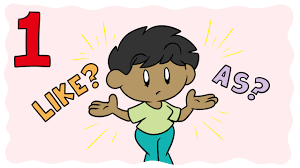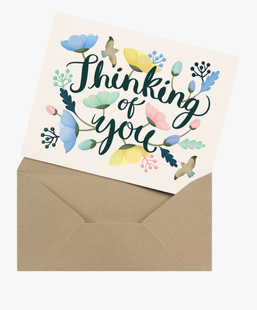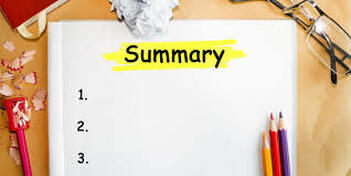 A SIMILE is "a figure of speech that compares two different things using LIKE or AS. For younger writers, it's fun to figure out what commonly used similes mean. For more advanced writers, coming up with unique and tailored similes can really enhance your stories and essays. Read on for some examples! Here are some commonly used similes used in sentences. If you have younger children or students, ask them what they think the similes mean. Afterward, you can challenge them to dream up their own similes. My heart is like an open book. A clambake is American as apple pie. Every day, Mr. Wilson comes from from work hungry as a bear. Without my glasses, I'm blind as a bat. My friend is sly as a fox and always manages to steal my cookies. ____________________________________________________ How do you create unique, tailored similes? By relating them to the interests or passions of different characters. Here are a couple of examples to illustrate my point: My driving instructor let out a sigh like a tire rapidly losing air when I failed to use my blinker for the third time. When Mr. Hall's giant pumpkin failed to win first prize, he drooped like a thirsty sunflower. I hope I've inspired you to go forth and create some unique, tailored similes for your own stories and essays! Happy 4th of July weekend! Take care, everyone. Sincerely, Laura Fineberg Cooper A Spoonful of Grammar
3 Comments
 OLOGY: "A subject of study or branch of knowledge." OLOGIST: "One who studies." For fun, I'll share the definitions of 10 OLOGY words - 5 you're familiar with and 5 that should surprise and delight you. After you read my list, I hope you'll have fun decoding (or inventing) more OLOGIES on your own! OLOGIES you've probably heard of ... 1) BIOLOGY/BIOLOGIST: The scientific study of living organisms, broken into discrete specialties and often focused on particular areas. Anatomy, Cytology (cells), and Botany (plants) are among the branches of Biology. 2) PSYCHOLOGY/PSYCHOLOGIST: The scientific study of the way people think and act. In this case, the OLOGIST form refers to an expert in the field who counsels others. The root comes from psyche, which means the soul in Ancient Greek. 3) ZOOLOGY/ZOOLOGIST: The branch of biology that concerns study of the animal kingdom. The word zoo actually derives from the Ancient Greek name for animal. 4) ORTHNITHOLOGY/ORTHNITHOLOGIST: The scientific study of birds 5) ASTROLOGY/ASTROLOGIST: The study of how the movement of celestial bodies can be used to predict events and cast horoscopes. Does it work? Astrologists certainly believe so. OLOGIES that may surprise you ... 6) OOLOGY/OOLOGIST: The branch of ORTHNITHOLOGY that focuses on eggs, nests, and breeding habits of birds. It used to be a hobby for gentleman who fancied the collection of colorful wild eggs. Luckily, that practice is now largely prohibited. 7) AREOLOGY/AREOLOGIST: Study of the planet Mars. This derives from the Ancient Greek god of war, Ares. Interestingly, the planet itself is named after the Ancient Roman counterpart, Mars. 8) ICHTHYOLOGY/ICHTHYOLOGIST: The scientific study of fish, deriving from ikhthus, which means fish in Ancient Greek. 9) HOROLOGY/HOROLOGIST: the craft of designing and/or manufacturing clocks. The root of these words means time. Can you think of another word with the root HORO? I'll give you a big clue: I'm a Taurus. What's your sign? 10) TAUTOLOGY: useless repetition or stating the same thing twice, thinking that will make it true and likely driving others crazy. In this case, I doubt there's such thing as a TAUTOLOGIST. In fact, there's no study of this either. Or at least I hope not! (FYI: when you see a word with multiple consonants strung together and Y instead if I, you can guess it hails from Greek. Most Scientific classifications and mathematical words do in fact hail from the Ancient Greeks.) If you find or invent more interesting OLOGIES, please share! Take care, everyone. Sincerely, Laura Fineberg Cooper  Everyone, everywhere, let's come together to discuss the difference between ALTOGETHER and ALL TOGETHER. ALTOGETHER is an chameleon-like adverb with three definitions. (d.) completely: Randy was so frustrated with online learning, he considered skipping school altogether. (d.) on the whole, overall: Altogether, it was a lovely graduation celebration, even though we remained 6 feet apart. (d.) in all: Marilyn signed up for five AP classes altogether. *** If you seek a harmonious group, you're looking for ALL TOGETHER! (d.) as a group: All together, let's recite the following words: hope, dream, create, inspire. (d.) at the same time, in synch: The synchronized swimming team exemplifed the beauty of working all together. I'm ALTOGETHER finished with this post. I hope we can safely come ALL TOGETHER in person, very, very soon. Sincerely, Laura Fineberg Cooper Underneath the Categories heading to the right, you'll find the Sign Up form to receive A Spoonful of Grammar directly in your inbox.  If you're like me and treasure receiving a personal note, letter, or card, you should make sure to know the difference between STATIONARY and STATIONERY! One of these words means note paper and the other means standing still. Do you know which is which? Go ahead and take a guess before I provide the answer. (No peeking!) If you guessed that STATIONERY is another word for note paper (especially the kind with matching envelopes), you are correct! STATIONARY means standing still, which is what many of us feel like with so much being done virtually instead of face-to-face. I hope you are enjoying nature and connecting with friends and family in any way possible. STATIONARY can also mean unchanging and consistent. That's all for this spoonful. I have to cut it short as I feel inspired to send someone a card! Take care, everyone. I'll be back next Sunday with another short, sweet spoonful. Sincerely, Laura Fineberg Cooper  Summaries are the EASIEST way to peruse my posts to discover which pique your interest. Every title is imbedded with a link: just click and you'll be brought to the page(s) you desire. To peruse earlier spoonfuls, click on All Summaries under the Categories section to the right. Enjoy! Spoonful #50: WHICH vs. THAT These words are NOT interchangeable. I provide a simple way to determine when each is appropriate to use. Spoonful #51: TONE AND ATTITUDE WORDS Helpful for writing dialogue or evaluating characters! Spoonful #52: HANDY HYPHEN RULES Ten handy hyphen rules to help writers of all ages. Spoonful #53: COMPOUND POSSESSION Do two sisters share a single bike or each possess their own? Do two friends share common beliefs or each possess their own? Hint: show the answer with proper apostrphe placement. Spoonful #54: HOPE We can all use a dose of hope and positivity. Spoonful #55: The BEST BLUEBERRY and RASPBERRY MUFFINS This muffin recipe from the Captain Lord Mansion in Kennebunkport, Maine is divine. And easy to make! Spoonful #56: THE ELLIPSIS EXPLAINED I must confess: I was a wee bit confused about this until I researched this post! Spoonful #57: MAY vs. MIGHT I wish I may, I wish I might, clarify these words tonight. Spoonful #58: SIGHT, SITE, and CITE Ever get these homophones confused? If so, let this post clear your confusion with clear examples. Spoonful #59: EVERYDAY vs. EVERY DAY Yes, my writer friends, there is a difference. Spoonful #60: THE COMMA SPLICE To avoid this #1 source of comma drama, read this post! Spoonful #61: THE RUN-ON SENTENCE e e cummings was known for radically experimenting with punctuation, but the SAT and ACT follow conventional punctuation and grammar rules. You should, too. Spoonful #62: Mom vs. mom: HAPPY MOTHER'S DAY! Many writers wonder when to capitalize dear, sweet mom. After reading this post, you'll never be confused again. Spoonful #63: SEASONAL CAPITALIZATION RULES Ever wonder whether or not to capitalize the seasons? Find out in this post. Spoonful #64: A LITTLE SUBJECT-VERB QUIZ Quiz yourself on your SUBJECT-VERB matching prowess! Here's a hint: first determine if your subject is singular or plural. I'll be back next week with a brand new spoonful. If you have any burning grammar, vocabulary, or punctuation questions, feel free to ask in the comments section below or send an email to [email protected]. One more thing: the SIGN UP page is now integrated with my posts. Submit your name and email to have weekly spoonfuls sent directly in your inbox! Sincerely, Laura Fineberg Cooper A Spoonful of Grammar |
Welcome to
|
 RSS Feed
RSS Feed
